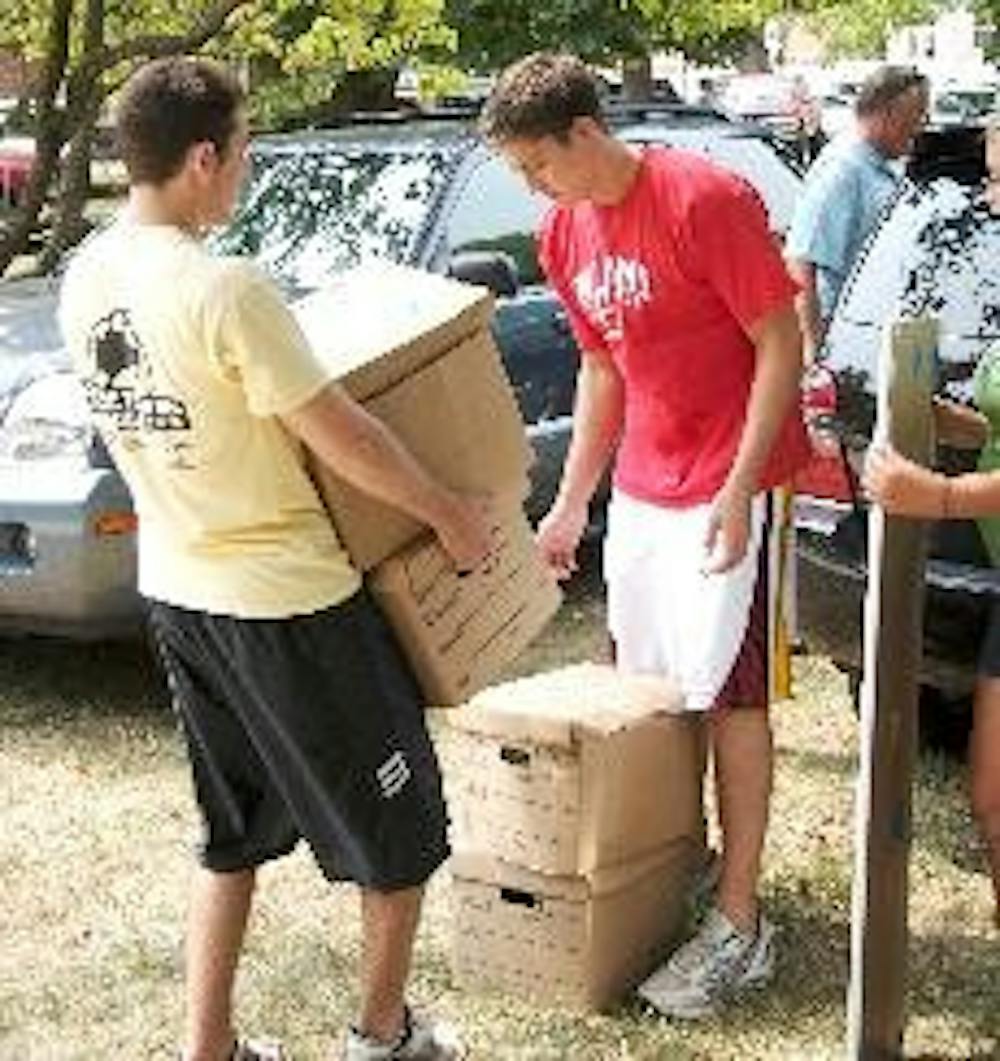
Sophomores Eric Hinkle and Matt Diamond move into their residence hall Saturday.
Starting with next year's entering first-year class, a new sophomore on-campus living requirement will mean all second year students will be required to reside on campus during their second year of classes.
According to Andrew Beckett, assistant dean of students, the first class it will impact is the class entering fall 2008, meaning the policy will not actually go into effect until fall 2009.
The proposal, which will require sophomores to live on campus, was developed by a long-range housing committee who examined the housing needs of students.
"It varies a bit, but there are roughly 7,200 to 7,300 spaces available," Beckett said. "We believe that Miami will have enough spaces to handle all of the students. It depends on how fraternities will or will not be exempted from the requirement."
At this stage in the planning, first-year fraternity members could be exempt from the sophomore living requirement.
"The fraternity exemptions are really driving the process," Beckett said. "A similar process to the housing lottery will be used (to assign housing this year). A committee is working out the issues right now."
Beckett explained that the first-year housing lottery that usually occurs early in the fall semester might be pushed back to a later date in 2008 depending on the committee's recommendations, in order to allow first-year students more time to choose where they will live during their sophomore year.
"That is a lot of pressure on an 18-year-old student after only being at Miami for four or five weeks," Beckett said. "The timeline will be changed-housing and dining has tried to have the same timeline as the landlords, but we will no longer need to compete with them for sophomores."
According to Beckett, two-thirds of sophomore students already live on campus.
"When push comes to shove, it will not be a huge number of students affected," he said.
Enjoy what you're reading?
Signup for our newsletter
April Consolo, a sophomore student who lives off-campus in Oxford Commons, agrees with Beckett's statement that the number of people who will be affected by the resolution is relatively small.
"If it affected me, it would make me mad," Consolo said. "But most sophomores live on campus, so it won't affect many people. Basically everyone I know who's a sophomore lives on campus."
For Rachel Guinn, who is also a sophomore student currently living off-campus in Oxford Commons, the biggest concern is the lack of amenities offered by residence halls as compared to off-campus housing options.
"Living in a dorm wasn't that great, and I got asked to be someone's roommate here, so I decided to live here." Guinn said. "The thing that would make me mad is that they are making students pay money to live in a dorm, although I guess dorm life wasn't all that bad-it was kind of fun."
However, Mike Everett of CJ Management, a housing business in Oxford, is very concerned about those students who will be affected by the resolution.
"I hate to see that they are taking privileges away from the sophomores," Everett said. "You can teach a lot of things out of a book, but you can't teach common sense. You don't learn that until you're on your own. Leases, for example. If you were on your own, you would be learning how to manage a lease and be able to apply that knowledge in the future. What other privilege are they going to take away next?"
Everett believes the new sophomore living requirement would not have much of a detrimental result on his own business, but he is worried about younger businesses in Oxford.
"We have some nice houses and nice locations and they all seem to rent out," he said. "I'm sure (the requirement) will have an effect on our business, but I don't know at this time what kind of effect it will have. I've been in business 20 years. I'm worried about younger businesses in Oxford who have just gotten started."
Beckett explained that the reasoning behind the requirement was the fact that sophomores who live on campus are more engaged with campus life. They don't seem to follow the pattern of a "sophomore slump" or a "lost year."
"The second year is a time when students reflect on their first year, realize they made mistakes, realize that they are not satisfied with certain relationships or things they got involved with, and they re-focus on what they want to get out of the next three years both inside and outside the classroom," Beckett said.
He added that with more students living on campus, more resident assistants would not be required, but different types of programming would need to be developed.
"We want to allow the students more governance and responsibilities over residence halls to prepare them to move off campus," Beckett said. "We want to help students become comfortable confronting one another and dealing with problems."
Everett disagrees with this philosophy, and instead believes that by a student's second year, they are ready to make decisions without supervision.
"When do they figure you're an adult?" Everett said. "That's not hardly fair to a college student who is coming to learn. "Part of learning and growing up is being on your own and making your own decisions. They are going to do the thinking for you."
Although the proposed sophomore living requirement passed last year, Beckett emphasized that it is still a work in progress.
"We need the students to partner with us," he said. "It's not set in stone, so there is still plenty of time for the members of the community to give their input."




